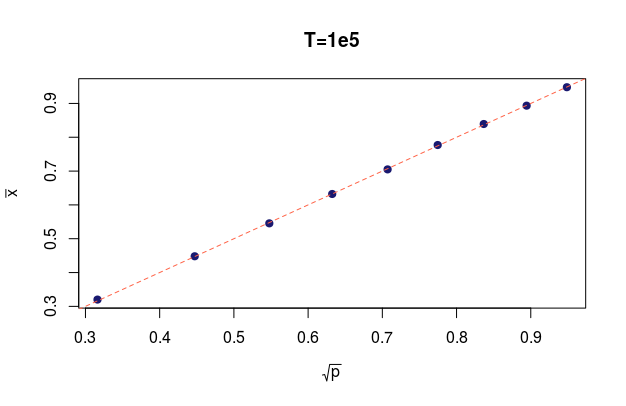Except when $k=1$, given a finite sequence of i.i.d. Bernoulli
$\mathcal B(θ)$ random variables $X_1,X_2,\ldots,X_m$, there exists no
unbiased estimator of $(1−θ)^{1/k}$, when $k$ is a positive integer.
The reason for this impossibility is that only polynomials in $\theta$ of degree at most $m$ can be unbiasedly estimated. Indeed, since $Y_m=m\bar{X}_m$ is a sufficient statistic, we can assume wlog that an unbiased estimator is a function of $Y_m\sim\mathcal Bin(m,p)$, $\delta(Y_m)$, with expectation
$$\sum_{i=0}^m \delta(i) {m \choose i} \theta^i(1-\theta)^{m-i}$$
which is therefore a polynomial in $\theta$ of degree at most $m$.
See Halmos (1946) for a general theory of unbiased estimation that points out the rarity of unbiasedly estimable functions.
However, when changing the perspective, there exists an unbiased estimator of $\theta^a$, $a\in(0,1)$, when considering instead an infinite sequence of i.i.d. Bernoulli $\mathcal B(θ)$ random variables $X_1,X_2,\ldots$ This is a consequence of the notion of a Bernoulli factory.
Given a known function $f:S\mapsto (0,1)$, we consider the problem of
using independent tosses of a coin with probability of heads $\theta$
(where $\theta\in S$ is unknown) to simulate a coin with probability of
heads $f(\theta)$. (Nacu & Peres, 2005)
Mendo (2018) and Thomas and Blanchet show that there exists a Bernoulli factory solution for $θ^a$, $a\in (0,1)$, with constructive arguments. The first author uses the power series decomposition of $f(\theta)$
$$f(\theta)=1-\sum_{k=1}^\infty c_k(1-\theta)^k\qquad c_k\ge 0,\,\sum_{k=1}^\infty c_k=1$$
to construct the sequence$$d_k=\dfrac{c_k}{1-\sum_{\kappa=1}^{k-1}c_\kappa}$$ and the associated algorithm
- Set i=1.
- Take one Bernoulli $\mathcal B(θ)$ input Xi.
- Produce Ui Uniform on (0,1). Let Vi = 1 if Ui < di or Vi = 0 otherwise.
If Vi or Xi are 1, output Y = Xi and finish. Else increase i by 1 and go back to step 2.
For instance, when $f(\theta) =\sqrt\theta$ the coefficients $c_k$ are
$$c_k=\frac{1}{2^{2k−1}k}{2k-2 \choose k−1}$$
Here is an R code illustrating the validity of the method:
ck=exp(lchoose(n=2*(k<-1:1e5)-2,k=k-1)-log(k)-{2*k-1}*log(2))
dk=ck/(1-c(0,cumsum(ck[-1e5])))
be <- function(p){
i=1
while((xi<-runif(1)>p)&(runif(1)>dk[i]))
i=i+1
1-xi}
for(t in 1:1e5)ck[t]=be(p)
and the empirical verification that the simulated outcomes are indeed Bernoulli $\mathcal B(\sqrt{\theta})$:

As an aside estimating $\theta^{1/k}$ or $(1-\theta)^{1/k}$ has a practical appeal when considering Dorfman's group blood testing or pooling where blood samples of $k$ individuals are mixed together to speed up the confirmation they all are free from a disease.

